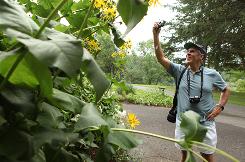By Joe Brier, for USA TODAY
Early Alzheimer's patient Bob Blackwell photographs the flowers and wildlife at Meadowlark Botanical Gardens in Vienna, Va., Aug. 12.
A smile crosses Bob Blackwell's face as he gently lifts his camera to his eye and zooms in on a black-and-yellow swallowtail butterfly hovering near the same flower as a yellow finch.
A little while later, Blackwell, 66, rests in the shade of a gazebo at Meadowlark Botanical Gardens in Vienna, Va., where he enjoyed a balmy late summer morning recently, snapping images of nature.
"Doing this …" he says, gesturing to the cameras slung around his neck and then spreading his arms out toward the lake and rolling green hills surrounding him, "It makes me forget. It makes me happy." 
It's not often Blackwell will tell you forgetting is a good thing. He has Alzheimer's disease, a memory-robbing illness that pushed the former CIA analyst into early retirement, and these days makes him forget the words to his favorite church hymns and the name of the bird he just photographed. But when he's behind the lens of his camera, it's his disease he forgets.
Blackwell is among many people who suffer from some form of dementia who are pursuing fine-arts activities — including photography, painting and music. Patients, their caretakers, Alzheimer's doctors and arts-program organizers say the benefits of taking up a brush, viewing a masterpiece or hearing the strains of a classical arrangement are multi-faceted.
"An art or music experience is another way to give people a vehicle to express themselves, to communicate feelings they might not be able to share verbally anymore," says Beth Kallmyer, director of Family and Information Services for the Alzheimer's Association.
These aren't arts-and-crafts sessions involving Popsicle sticks and paste, say those who lead such programs. Major museums and symphony halls are involved, as well as professional artists.
"Our program has integrity. We're using archival materials and brushes. It's not a craft program. We really believe people with dementia deserve high-quality materials, high-bond watercolor paper," says Joanne Fisher, the statewide coordinator and event manager for "Memories in the Making," an Alzheimer's Association of Colorado series that collaborates with professional artists from the state to help patients produce and sometimes sell their artwork.
Fisher says the program began 15 years ago with five sites and has blossomed to more than 85 locations in nursing homes, assisted-living facilities and community centers throughout the state.
Elsewhere, museums and symphonies are opening their doors to those with dementia. In Phoenix, Banner Alzheimer's Institute began collaborating with the Phoenix Symphony, the Phoenix Art Museum, and the Scottsdale Museum of Contemporary Art two years ago, inviting people with mild to moderate dementia and their caretakers to attend regularly scheduled tours and performances. Pre-concert discussions by musicians and post-tour seminars occur during normal business hours because Banner's project coordinators say they wanted attendees to gain a feeling of belonging.
"There's a real sense of isolation about these folks, that they're separate and that they stand out. We wanted them to feel like they're like everybody else," says Jan Dougherty, director of family and community services at Banner.
Vicki McAllister, research and program coordinator at Banner, says they've been studying the effects of the programs on the well-being of more than 144 participants, half with dementia, and half who are caretakers. "Many say they've found a venue where they can stop the hectic pace of doctor appointments and fears of the future, and be more in the moment together," McAllister says.
Howard Grossman, 82, and his wife Connie, 76, who has Alzheimer's, attended the Phoenix Art Museum program and enjoyed it so much they now go back weekly on their own.
"The museum keeps us together. We hold hands, we walk," Grossman says. "She may not be able to appreciate and discuss the art, but there is a connection," he says.
Physicians say enjoying the arts in a group format is good for people with Alzheimer's, but Blackwell prefers his solitary strolls and kayaking forays down the Au Sable River near his vacation home in Michigan, when he can snap photos of his favorite bird, the blue heron. "I love sneaking up on them really close and catching them off guard," he says, pointing to photos his wife, Carol, downloaded onto their computer.
Carol says her husband's hobby opens up his creative side and gives him a passion.
Blackwell says he may just try to sell a few. "It may be a pie in the sky, but I am hoping I can turn it into a small business," he says.
http://www.usatoday.com/news/health/2009-09-15-alzheimers-blackwell_N.htm
"Arts allow Alzheimer's patients to live in the moment" --USA Today
September 16 2009
Mary Brophy Marcus Writer, USA TODAY
September 16 2009
Mary Brophy Marcus Writer, USA TODAY








